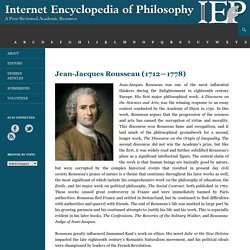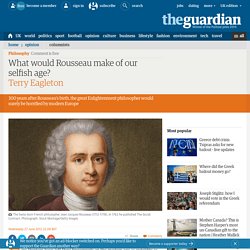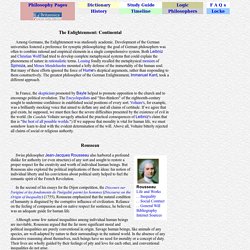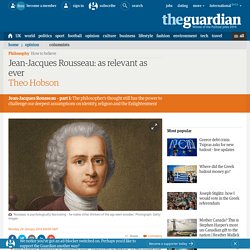

POLITICAL THEORY – Jean-Jacques Rousseau. Rousseau- The Basics. Jean-Jacques Rousseau was one of the most influential thinkers during the Enlightenment in eighteenth century Europe.

His first major philosophical work, A Discourse on the Sciences and Arts, was the winning response to an essay contest conducted by the Academy of Dijon in 1750. In this work, Rousseau argues that the progression of the sciences and arts has caused the corruption of virtue and morality. This discourse won Rousseau fame and recognition, and it laid much of the philosophical groundwork for a second, longer work, The Discourse on the Origin of Inequality. The second discourse did not win the Academy’s prize, but like the first, it was widely read and further solidified Rousseau’s place as a significant intellectual figure. Rousseau greatly influenced Immanuel Kant’s work on ethics. Table of Contents 1. A. Jean-Jacques Rousseau was born to Isaac Rousseau and Suzanne Bernard in Geneva on June 28, 1712.
In 1742 Rousseau went to Paris to become a musician and composer. B. 2. The Social Contract. Quote 1. Quote 2. Quote 3. What would Rousseau make of our selfish age? Few thinkers have left their fingerprints on the modern age as indelibly as Jean-Jacques Rousseau, the tricentenary of whose birth we celebrate on Thursday (28 June)..

He was a philosopher who helped shape the destiny of nations, which is more than can be said for Pythagoras or AC Grayling. He was also a political visionary of stunning originality, a potent influence on the French revolution and a source of inspiration for the Romantics. Those who like their fiction drenched in lofty moral sentiment can also claim him as a great novelist. Much of what one might call the modern sensibility was this thinker's creation. It is in Rousseau's writing above all that history begins to turn from upper-class honour to middle-class humanitarianism. Above all, Rousseau is the explorer of that dark continent, the modern self. It is true that he seems to have held the view that no identity was more uniquely precious than his own. In this, he was a notable precursor of Karl Marx.
The French Revolution: Ideas and Ideologies. Enlightenment II. The Enlightenment: Continental Among Germans, the Enlightenment was studiously academic.

Development of the German universities fostered a preference for synoptic philosophizing: the goal of German philosophers was often to combine rational and empirical elements in a single comprehensive system. Both Leibniz and Christian Wolff had tried to develop complete metaphysical systems that could explain the phenomena of nature in rationalistic terms. Lessing fondly recalled the metaphysical monism of Spinoza, and Moses Mendelssohn mounted a lofty defense of the immortality of the human soul. But many of these efforts ignored the force of Hume's skeptical arguments, rather than responding to them constructively. In France, the skepticism promoted by Bayle helped to promote opposition to the church and to encourage political revolution.
Rousseau It is concern for private property, according to Rousseau, that gives rise to civil society. History Study Centre. Jean-Jacques Rousseau: as relevant as ever. Jean-Jacques Rousseau is generally seen, especially in Britain, as the worst sort of intellectual: absurdly self-regarding, and dangerously naive, in his fond belief in the natural goodness of humanity, which fed the excesses of the French Revolution, and maybe sowed other totalitarian seeds.

I have come to think he deserves more respect. While recently researching the roots of secular humanism, I found that he stood out from the list of dead white males I was considering. While other thinkers made important contributions to this or that movement, Rousseau made the weather. Also, he is psychologically fascinating – he makes other thinkers of the age seem wooden. Also, I think that looking at Rousseau's thought can nudge us towards more intelligent discussion of religion and atheism.
Rousseau was born in Protestant Geneva in 1712. What was his problem? He also found a wider audience as a novelist. Do We Need Government? (The Social Contract) – 8-Bit Philosophy.